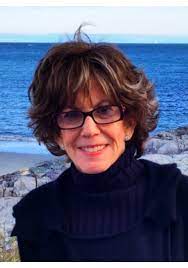
Pamela Braun Cohen, named by human rights activist Natan Sharansky “a Five-Star General of Students and Housewives,” became an activist in the Soviet Jewry movement of the early 1970s. She served as co-chair of Chicago Action for Soviet Jewry from 1978 until 1986, following which she became the national president of the Union of Councils for Soviet Jews (UCSJ). Her leadership role took her to the halls of Congress and the White House and, of course, on numerous trips to the Soviet Union.
Pamela Cohen recently published her first book Hidden Heroes – One Woman’s Story of Resistance and Rescue in the Soviet Union. Recognition of her impressive achievements has included the Humanitarian Award from the Raoul Wallenberg Committee of Chicago, the Medal of Honor from refuseniks (an appellation for Jews who were refused exit visas from the Soviet Union) and a Doctor of Human Letters degree, (an honorary degree awarded to those who have distinguished themselves through humanitarian and philanthropic contributions to society) from Spertus College of Judaica. She lives in Deerfield, Illinois, with her husband Leonard. They divide their time between family in the United States and their home in Jerusalem.
Q: What was the situation for Jews in the Soviet Union?
From the time of the Czars, over the course of three centuries in Russia, it was never good. The situation slumped to its lowest level under the rule of Stalin. His government of terror deliberately eradicated many cultural and social aspects. Nothing was permitted concerning yiddishkeit: no books or religious ceremonies, no contact with the West, no freedom of religion or speech. If you overstepped and were suspected of an infringement, you could be fired from your job – or worse, sent off to the frozen wasteland of Siberia. The Soviets arrested most of the intellectuals and deported them there.
If you can imagine what it would be like to live as a Jew today in North Korea, and with forced assimilation – that’s what it was like. Borders were impenetrable. There was almost no information about the West until 1948. That’s the way it was in the USSR.
Q: What caused the Soviet Jews to want to leave the USSR?
During Israel’s War of Independence in 1948, the Soviet propaganda machine broadcast the event with a highly antisemitic slant, portraying Israel as an anti-Soviet state that was collapsing. They were showing Jewish soldiers who were being defeated during battle. That was when Soviet Jews realized that there were Jewish soldiers who were fighting. Despite the antisemitic portrayal, the Soviet Jews were able to see that this was a Jewish State. It was their country and their homeland. This realization stirred within them a strong desire to emigrate.
Q: American journalist John Chancellor reported that a group of Soviet Jews had been arrested for trying to hijack a plane from Leningrad to the West. Please tell us about this?
Emigration was strictly forbidden. So a few Jews, including Rabbi Yosef Mendelevitch and Sylva Zalmanson, decided that they needed to send up a flare with an SOS message to the world saying that they were here in the USSR and wanted to leave. The only way they could do that was by getting arrested. So Rabbi Mendelevitch and 15 others hijacked an airplane from Leningrad to Sweden. Of course, they were all arrested on the tarmac because there were KGB men everywhere who knew what was going on. That was the beginning of the emigration movement.
Q: Why did Natan Sharansky call you “a Five-Star General of Students and Housewives?”
Natan Sharansky was referring to the time after he applied to emigrate. His activity led him to be arrested and he was held in pre-trial isolation for almost a year. He had recently married and his wife was forced to leave the Soviet Union. She went to the UK as well as the United States, where she led demonstrations on his behalf.
In one of the encounters with the KGB interrogators, they showed him a film. On the film was a march of students and housewives led by Sharansky’s wife Avital. In a very negative and cynical way, the KGB said to Sharansky “Look, you think that you are going to be freed, Sharansky? Look who is leading. The only ones who care about you are a band of students and housewives!”
Q: How did your involvement begin?
In 1970, there were people in the West like myself and many others who understood what was happening. We were of different ages, backgrounds, religious affiliations, and were spread across the country. We had no contact with each other. But we were all united in the idea of freeing them from their plight and motivated to help our brethren. We managed to reach out and make contact with the Soviet Jews. We wrote letters to Soviet officials in protest of the Leningrad defendants who hijacked the plane and sent off requests for intervention to our representatives and senators. We became part of a group of activist-oriented mothers who met regularly to discuss affairs of the nation.
Q: What hashgacha pratit, Divine providence, did you witness in your movement’s efforts to rescue the Jews from the Soviet Union and help them emigrate to Israel?
Everything we did was an example of hashgacha pratit. One example occurred when the refuseniks were deprived access to the hospitals. A sister of one refusenik, who wasn’t a refusenik herself, needed a heart valve. We were notified serendipitously (since phone contact was out of the question) and a few hours later, a doctor offered a heart valve! It just so happened that a businessman offered to take it to her. He was planning on traveling to the very city where the woman lived.
Another example of hashgacha pratit was concerning a refusenik from Odessa. He had been badly beaten in prison and was being treated by a Chinese homeopathic doctor. She needed “bear fat” to treat the patient’s wounds. Two days later, the bear fat arrived via Soviet Jewry activists in Alaska by way of Vladivostok, and from there across seven time zones to Moscow.
Q: What was the most memorable moment you experienced while trying to rescue the Soviet Jews?
I recalled the advice of famed refusenik Yosef Mendelevitch, one of the hijackers in 1970 whose actions had first inspired me. He managed to secretly communicate with me from his prison cell in Siberia and confided to me that he was learning Hebrew. Each day he wrote a word on a slip of paper and hid it in his belt. He suggested that I do the same. How could I ignore my own Jewish learning, I wondered, when I was faced with examples of men and women who worked so hard just for the privilege of learning a single Hebrew word?
When dissident Hebrew teacher Ari (Leonid) Volvosky wrote to me to ask if I would send him an English-language copy of the classic Jewish work Book of Our Heritage by Eliyahu Kitov, I happily complied, and bought a copy for myself as well! After that, I resolved that every book that refuseniks asked for in English, I would get a copy of for myself.
After the Soviet Jews were freed, I led a rally with Sharansky in Washington, D.C. in December of 1987. At this rally, there were 250,000 Jews from all walks of life screaming the rallying cry, “Am Yisrael Chai!” which means “the Jewish nation lives on!”
Q: Tell us about your new book Hidden Heroes – One Woman’s Story of Resistance and Rescue in the Soviet Union?
Hidden Heroes – One Woman’s Story of Resistance and Rescue in the Soviet Union is a behind-the-scenes personal narrative of the largest rescue of Jews in the world by a small group of individuals. For Soviet Jews, there was no rest from the suffering, deprivation, prison terms on trumped-up charges, beatings, and denial of lifesaving medical treatment. So the Union of Councils for Soviet Jews (UCSJ), an umbrella group of 40 local grassroots organizations, with affiliates in England, France, and Israel, constantly found creative new ways to publicize their suffering in the media and through lobbying efforts.
The book also details the unsung heroes, everyday people who lived in the Soviet Union, who achieved incredible moral stature by heroically standing up to the terror and endless threats of the KGB. Also included is a dramatic portrayal of the heroes in the West who relentlessly fought on behalf of the Soviet Jews. The book shows candidly how one person can make a difference and that we are all responsible for each other.
Hidden Heroes – One Woman’s story of resistance and rescue in the Soviet Union by Pamela Braun Cohen
